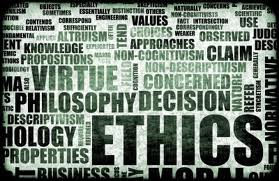Values and Ethics in simple words mean principle or code of conduct that govern transactions; in this case business transaction. These ethics are meant to analyse problems that come up in day to day course of business operations. Apart from this it also applies to individuals who work in organisations, their conduct and to the organisations as a whole. We live in an era of cut throat competition and competition breeds enmity. This enmity reflects in business operations, code of conduct. Business houses with deeper pockets crush small operators and markets are monopolised. In such a scenario certain standards are required to govern how organizations go about their business operations, these standards are called ethics. Business ethics is a wider term that includes many other sub ethics that are relevant to the respective field. For example there is marketing ethics for marketing, ethics in HR for Human resource department and the like. Business ethics in itself is a part of applied ethics; the latter takes care of ethical questions in the technical, social, legal and business ethics.
Origin of Business Ethics-
When we trace the origin of business ethics we start with a period where profit maximisation was seen as the only purpose of existence for a business. There was no consideration whatsoever for non-economic values, be it the people who worked with organisations or the society that allowed the business to flourish. It was only in late 1980’s and 1990’s that both intelligentsia and the academics as well as the corporate began to show interest in the same.
Nowadays almost all organisations lay due emphasis on their responsibilities towards the society and the nature and they call it by different names like corporate social responsibility, corporate governance or social responsibility charter. In India Maruti Suzuki, for example, owned the responsibility of maintain a large number of parks and ensuring greenery. Hindustan unilever, similarly started the e-shakti initiative for women in rural villages.
Globally also many corporations have bred philanthropists who have contributed compassion, love for poor and unprivileged. Bill gates of Microsoft and Warren Buffet of Berkshire Hathaway are known for their philanthropic contributions across globe.
Many organisations, for example, IBM as part of their corporate social responsibility have taken up the initiative of going green, towards contributing to environmental protection. It is not that business did not function before the advent of business ethics; but there is a regulation of kinds now that ensures business and organisations contribute to the society and its well being.
Nowadays business ethics determines the fundamental purpose of existence of a company in many organizations. There is an ensuing battle between various groups, for example between those who consider profit or share holder wealth maximisation as the main aim of the company and those who consider value creation as main purpose of the organisation.
The former argue that if an organisations main objective is to increase the shareholders wealth, then considering the rights or interests of any other group is unethical. The latter, similarly argue that profit maximisation cannot be at the expense of the environment and other groups in the society that contribute to the well being of the business.
Nevertheless business ethics continues to a debatable topic. Many argue that lots of organisations use it to seek competitive advantage and creating a fair image in the eyes of consumers and other stakeholders. There are advantages also like transparency and accountability.
















